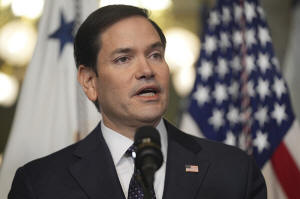US aid agency is in upheaval during foreign assistance freeze and staff
departures
 Send a link to a friend
Send a link to a friend
 [January 31, 2025]
By MATTHEW LEE and ELLEN KNICKMEYER [January 31, 2025]
By MATTHEW LEE and ELLEN KNICKMEYER
WASHINGTON (AP) — Trump administration changes have upended the U.S.
agency charged with providing humanitarian aid to countries overseas,
with dozens of senior officials put on leave, thousands of contractors
laid off, and a sweeping freeze imposed on billions of dollars in
foreign assistance.
Secretary of State Marco Rubio defended the pause on foreign assistance
Thursday, saying “the U.S. government is not a charity.”
Aid organizations say the funding freeze — and deep confusion over what
U.S.-funded programs must stop work as a result — has left them
agonizing over whether they could continue operating programs such as
those providing round-the-clock nutritional support to extremely
malnourished infants and children, knowing that closing the doors means
that many of those children would die.
Current and former officials at the State Department and the U.S. Agency
for International Development say staffers were invited to submit
requests to exempt certain programs from the foreign aid freeze, which
President Donald Trump imposed Jan. 20 and the State Department detailed
how to execute on Jan. 24.
Three days later, at least 56 senior career USAID staffers were abruptly
placed on administrative leave.
Three officials said many of those put on leave were lawyers involved in
determining what programs might qualify for waivers, helping write
proposals and submitting those waiver requests as they believed they had
been invited to do.
The officials spoke on condition of anonymity for fear of reprisal. A
Trump administration directive that aid organizations interpret as a gag
order has left them unwilling to speak publicly for fear of permanently
losing U.S. funding.

In an internal memo Monday about the staffing changes, new acting USAID
administrator Jason Gray said the agency had identified “several actions
within USAID that appear to be designed to circumvent the President’s
Executive Orders and the mandate from the American people.”
“As a result, we have placed a number of USAID employees on
administrative leave with full pay and benefits until further notice
while we complete our analysis of these actions,” Gray wrote.
A former senior USAID official said those put on leave had been helping
aid organizations navigate the “confusing process” to seek waivers from
the aid pause for specific life-saving projects, such as continuing
clean water supplies for displaced people in war zones.
Others were identified as having been involved in diversity, equity and
inclusion programming, which the administration has banned.
On Thursday, a USAID human resources official who tried to reverse the
action, saying there was no justification for it, was himself placed on
leave, according to two of the officials who had viewed internal emails
and verified them as authentic. Reporters from ProPublica and Vox first
reported the emails on X.
The State Department and White House didn’t respond to messages seeking
comment about the staffing changes.
[to top of second column]
|

Secretary of State Marco Rubio speaks after being sworn in by Vice
President JD Vance in the Vice Presidential Ceremonial Office in the
Eisenhower Executive Office Building on the White House campus,
Tuesday, Jan. 21, 2025, in Washington. (AP Photo/Evan Vucci)

The new leaders at USAID also abruptly laid off contractors who made
up about half the workforce in the agency’s humanitarian bureau
Tuesday, knocking them out of systems so that some vanished in the
middle of videoconferences, the former senior official said. The
targeted institutional service contractors do everything from
administrative and travel support to grant processing and data
analytics.
The staffing changes came three days after the State Department
issued guidelines last Friday for implementing Trump’s executive
order freezing foreign assistance for 90 days. The department says
it's reviewing the money the United States is spending to ensure it
adheres to administration policy.
The guidelines initially exempted only military aid to Israel and
Egypt and emergency food programs but also said program
administrators and implementors could apply for waivers for programs
that they believe would meet administration standards.
On Tuesday, Rubio issued a broader waiver for programs that provide
other “life-saving” assistance, including medicine, medical
services, food and shelter, and again pointed to the possibility of
waivers. Rubio pointed to the broadened exemptions in an interview
Thursday with SiriusXM host Megyn Kelly.
“We don’t want to see people die and the like,” he said.
Rubio said there would be a program-by-program review of which
projects make “America safer, stronger or more prosperous.”
The step of shutting down U.S.-funded programs during the 90-day
review meant the U.S. was “getting a lot more cooperation” from
recipients of humanitarian, development and security assistance,
Rubio said. “Because otherwise you don’t get your money.”
The State Department said that since the aid freeze went into
effect, it has approved dozens of waivers, although many were
returned because they did not include enough detail. It said waiver
requests for programs costing “billions of dollars” have been
received and are being reviewed.
The department did not specify how many waiver requests had been
denied but said thus far its actions had stopped more than $1
billion from being spent on programs and projects that are “not
aligned with an America First agenda.”
Even with the broadening of exemptions for life-saving care,
uncertainty surrounds what U.S.-funded programs legally can
continue. Hundreds of thousands of people globally are going without
access to medicine and humanitarian supplies and clinics are not
getting medicine in time because of the funding freeze, aid
organizations warn.
——
AP reporter Rebecca Santana in Washington contributed.
All contents © copyright 2025 Associated Press. All rights reserved |